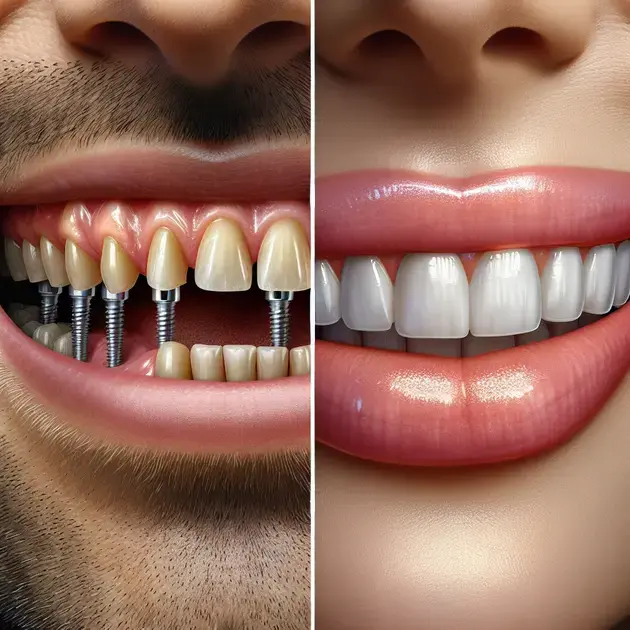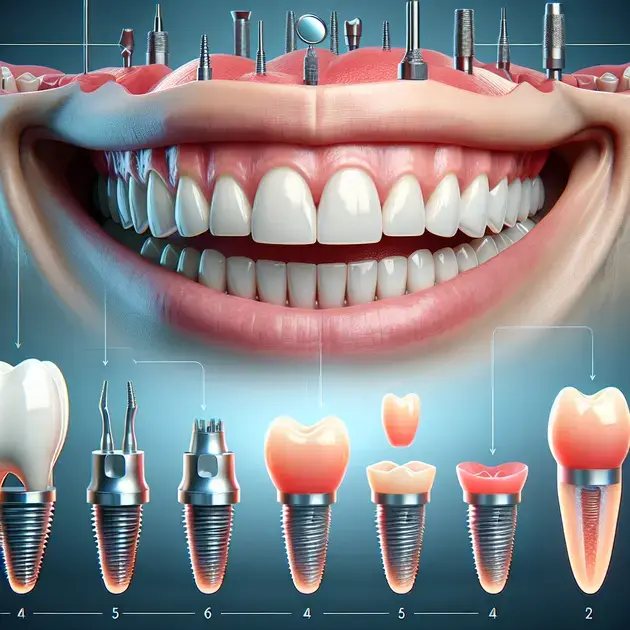When it comes to restoring your smile, dental implants are a popular and effective option. Understanding the ins and outs of dental implants is crucial for making informed decisions about your oral health. In this comprehensive guide, we cover everything you need to know about dental implants.
From the benefits of dental implants to the different types available, we will walk you through the process step by step. Stay tuned to learn how dental implants can transform your smile and improve your overall quality of life.

The Benefits of Dental Implants Explained
Dental implants offer numerous benefits for individuals looking to restore their smile and oral health. One of the primary advantages of dental implants is their durability and longevity. Unlike other dental restoration options, such as bridges or dentures, implants are designed to last a lifetime with proper care. This means that once the implant is placed and integrated into the jawbone, it can function just like a natural tooth.
Another benefit of dental implants is their ability to prevent bone loss in the jaw. When a tooth is lost, the underlying jawbone can begin to deteriorate over time. Dental implants help stimulate the jawbone, preserving its structure and strength. This not only maintains facial aesthetics but also supports overall oral health.
Furthermore, dental implants provide enhanced comfort and stability compared to traditional dentures. Since implants are securely anchored in the jaw, they eliminate the worry of slipping or discomfort when eating or speaking. This stability can significantly improve the quality of life for individuals who opt for dental implants.
For those concerned about aesthetics, dental implants offer a natural-looking solution to missing teeth. The implant crown is custom-made to blend seamlessly with the surrounding teeth, creating a beautifully uniform smile. This aesthetic appeal can boost confidence and self-esteem for individuals who have undergone dental implant treatment.
Lastly, dental implants promote better oral health by not requiring alterations to adjacent teeth, as is often necessary with other dental restoration methods. By preserving the integrity of surrounding teeth, implants help maintain overall oral hygiene and prevent further dental issues in the future.
Understanding the Different Types of Dental Implants
When considering dental implants, it’s essential to understand the different types available to determine the best option for your specific needs. The most common types of dental implants include endosteal implants, subperiosteal implants, and zygomatic implants.
1. Endosteal Implants
Endosteal implants are the most commonly used type of dental implant and involve surgically placing the implant directly into the jawbone. This type of implant is ideal for individuals with sufficient bone density to support the implant and is typically used for single tooth replacements or multiple teeth with a bridge.
2. Subperiosteal Implants
Subperiosteal implants are placed on top of the jawbone but underneath the gum tissue. This type of implant is suitable for individuals who do not have enough healthy jawbone to support an endosteal implant. Subperiosteal implants are custom-made to fit the shape of the jawbone and are a viable option for those seeking implant-supported dentures.
3. Zygomatic Implants
Zygomatic implants are used in cases where individuals have insufficient bone in the upper jaw to support traditional implants. Instead of placing the implant directly into the jawbone, zygomatic implants are anchored into the zygomatic bone (cheekbone). This innovative approach allows for the successful placement of implants even in challenging anatomical situations.
How Dental Implants Can Transform Your Smile
Dental implants have the power to transform not only your smile but your overall quality of life. By replacing missing teeth with natural-looking implants, individuals can enjoy a restored smile that looks and functions just like their original teeth. This transformation can have a profound impact on self-confidence and social interactions.
Moreover, dental implants can improve speech and chewing abilities, allowing individuals to speak clearly and eat comfortably without any restrictions. The stability and durability of implants make them an ideal long-term solution for those seeking to enhance their oral health and well-being.
Additionally, the transformation brought about by dental implants goes beyond aesthetics. By preserving jawbone health and maintaining the integrity of surrounding teeth, implants help support long-term oral health and prevent issues such as shifting teeth or jaw misalignment.
For individuals looking to enhance their smile and regain full dental functionality, dental implants offer a reliable and effective solution. The transformation that implants provide extends far beyond the physical appearance, impacting overall confidence, comfort, and oral health for years to come.

**
What to Expect During a Dental Implant Procedure
**
When undergoing a dental implant procedure, it is essential to have a clear understanding of what to expect throughout the process. Initially, the dentist will perform a comprehensive examination of your oral health, including X-rays and scans to determine the condition of your jawbone and surrounding tissues. This step is crucial in assessing whether you are a suitable candidate for dental implants.
Following the examination, the dentist will develop a personalized treatment plan tailored to your specific needs. This plan will outline the steps involved in the procedure, including the insertion of the titanium implant into the jawbone, the healing period, and the placement of the artificial tooth or crown. Your dentist will explain each stage of the process and address any concerns or questions you may have.
During the actual surgery, local anesthesia will be administered to ensure your comfort. The dentist will carefully place the implant into the jawbone, a process that may take a few hours to complete. After the implant is secured, a temporary crown may be attached while the area heals. It is normal to experience some discomfort and swelling following the procedure, but your dentist will provide guidelines on pain management and oral care.
Over the next few months, the implant will fuse with the surrounding bone through a process called osseointegration. During this period, it is crucial to follow your dentist’s instructions regarding oral hygiene, diet restrictions, and scheduled follow-up appointments. Once the implant has fully integrated, the final crown or prosthetic tooth will be attached, restoring both function and aesthetics to your smile.
In conclusion, understanding the steps involved in a dental implant procedure can help alleviate any concerns or fears you may have. By following your dentist’s guidance and maintaining good oral hygiene, you can achieve a successful outcome and enjoy the benefits of a restored smile.
**
Maintaining Oral Health After Getting Dental Implants
**
After receiving dental implants, it is crucial to prioritize your oral health to ensure the longevity and success of the implants. Proper care and maintenance are essential in preventing complications such as peri-implantitis and implant failure. Here are some guidelines on how to maintain oral health after getting dental implants:
1. **Brush and floss regularly**: Brushing and flossing are essential for keeping the implant and surrounding teeth clean and free of plaque. Use a soft-bristled toothbrush and non-abrasive toothpaste to avoid damaging the implant or gum tissue. Flossing helps remove food particles and bacteria from areas that are hard to reach with a toothbrush.
2. **Attend regular dental check-ups**: Regular visits to your dentist are essential for monitoring the health of your implants and detecting any issues early on. Your dentist will perform professional cleanings and examinations to ensure the implants are in good condition and recommend any necessary treatments.
3. **Avoid harmful habits**: Smoking, excessive alcohol consumption, and chewing on hard objects can negatively impact the health of your implants. These habits increase the risk of gum disease, implant inflammation, and implant instability. It is advisable to quit smoking and limit alcohol intake to maintain optimal oral health.
4. **Follow a balanced diet**: Eating a nutritious diet rich in vitamins, minerals, and antioxidants can support the healing process and promote overall oral health. Avoiding sugary foods, acidic beverages, and hard foods can minimize the risk of damaging the implants or developing oral infections.
By following these guidelines and practicing good oral hygiene, you can preserve the health and longevity of your dental implants. Remember to consult your dentist if you experience any issues or concerns regarding your implants to ensure prompt treatment and optimal outcomes.
**
Common Misconceptions About Dental Implants
**
Despite the numerous benefits of dental implants, there are several misconceptions surrounding this popular tooth replacement option. It is essential to debunk these myths and gain a clearer understanding of the reality of dental implants. Here are some common misconceptions about dental implants:
1. **Implants are uncomfortable**: One common misconception is that dental implants are uncomfortable and cause pain. In reality, implants are designed to function and feel like natural teeth, providing a comfortable and stable solution for missing teeth. With proper care and maintenance, implants can significantly improve your quality of life.
2. **Implants are only for the elderly**: Another misconception is that dental implants are only suitable for older adults. In truth, implants can benefit individuals of all ages who have lost a tooth due to injury, decay, or other issues. Whether you are in your twenties or sixties, dental implants offer a reliable and long-lasting solution for tooth replacement.
3. **Implants are costly**: While dental implants may have a higher upfront cost compared to other tooth replacement options, they offer long-term value and durability. Implants can last a lifetime with proper care, making them a worthwhile investment in your oral health and overall well-being. Additionally, many dental practices offer financing options to make implants more accessible to patients.
4. **Implants require extensive maintenance**: Contrary to popular belief, dental implants do not require special maintenance beyond routine oral hygiene practices. Brushing, flossing, and attending regular dental check-ups are typically all that is needed to maintain the health and longevity of implants. Your dentist may recommend specific oral care products or techniques to optimize implant health.
By dispelling these misconceptions and understanding the facts about dental implants, you can make an informed decision about this effective tooth replacement option. Consult with your dentist to learn more about the benefits of implants and determine if they are the right choice for restoring your smile.
**
Conclusion
**
Understanding the dental implant procedure is crucial for a successful outcome. From the initial examination to the final restoration, each step plays a vital role in restoring your smile. By following your dentist’s guidance and maintaining good oral hygiene, you can ensure the longevity and success of your implants. Remember, clear communication with your dentist and adherence to post-procedure care are key to achieving a positive experience.
After getting dental implants, prioritizing oral health is essential. Brushing and flossing regularly, attending dental check-ups, avoiding harmful habits, and following a balanced diet are fundamental in preserving the health of your implants. Consistent care and early detection of any issues can prevent complications and ensure the longevity of your dental implants.
Dispelling common misconceptions about dental implants is crucial for making informed decisions. Understanding that implants are comfortable, suitable for individuals of all ages, offer long-term value, and require standard oral hygiene practices can help you appreciate the benefits of this tooth replacement option. Consult your dentist to learn more and determine if dental implants are the right choice for enhancing your smile.